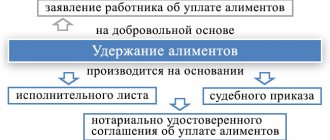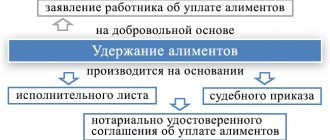Home/Alimony debts/Writing off alimony debt
According to statistics, payers do not always fulfill their obligations in good faith, which results in an accumulation of payments and an increase in debt. This serves as the basis for bringing a person to criminal liability for failure to fulfill duties in relation to a minor. At the legislative level, there is a possibility that allows you to write off alimony debt. Of course, not everyone can simply cancel part of their alimony debt. Write-off of alimony debt is provided subject to certain conditions and in accordance with the established procedure. This allows you to avoid criminal liability and reduces the financial burden.
Attention! If you have any questions, you can chat for free with a lawyer at the bottom of the screen or call Moscow; Saint Petersburg; Free call for all of Russia.
Is it possible to write off alimony debt?
In accordance with Art. 113 of the RF IC, the collection of alimony for the maintenance of an incapacitated needy family member is carried out on the basis of an agreement or a writ of execution. The debt can be collected no more than a three-year period before the provision of the writ of execution or certification of the agreement by a notary.
The amount of debt is established and calculated by the bailiff based on the amount of alimony, which is fixed in the court decision or agreement on the payment of funds. In the event that the final amount of the amount does not suit one of the parties for objective reasons, the bailiff’s decision can be appealed by filing a statement of claim in court. These rules and regulations are provided for in Art. 113 RF IC.
Attention
Situations often arise when the payer is indifferent to the responsibilities assigned to him, so a logical question arises: is it possible to reduce or completely write off the debt for alimony payments? Art. 114 of the RF IC indicates that exemption from payment of alimony debt, as well as debt for a penalty for late repayment, is possible. It is only necessary to comply with certain conditions.
What reasons are NOT considered valid?
Many payers, trying to avoid liability for alimony, make unforgivable mistakes in court. Let's look at some of them.
- Sometimes alimony providers refer to disagreement with the amounts of alimony. But this is useless: if you disagree, you need to pay and at the same time go to court to challenge it. The court decision cannot be ignored.
- Some payers, after the termination of a relationship or divorce, continue to live with the recipient of alimony in the same premises. This also does not apply to valid reasons.
- The person refers to the fact that he served a sentence in prison. This is also not a valid reason. Let us remember that in institutions of the penitentiary system, prisoners are usually involved in physical labor. And it is paid. A person has the right to refuse this work and spend the days of imprisonment in idle laziness. In such situations, the court examines whether the alimony payer avoided work, and, if so, for what reasons.
How can you write off alimony debt?
Art. 114 of the RF IC regulates two situations related to the formation of debt and penalties for non-payment of alimony debt. The first is associated with exemption from payment of debt or reduction in the amount of debt by mutual agreement between the parties. This is especially true if an agreement has been concluded between persons; it can be changed or supplemented in the presence of a notary with certification. The exception is funds allocated for the maintenance of a minor child.
Under what conditions can you write off or reduce alimony debt:
- The payer became seriously ill and lost the opportunity to provide financial support to a relative.
- The financial or family situation of the payer does not make it possible to provide support in the same volume as before. For example, a husband got married and had another child, which also requires material costs.
- There are valid reasons why the payer has lost the ability to pay funds in the same amount or cannot fulfill the obligation assigned to him at all.
Note:
In practice, situations of professional incompetence most often arise, which lead to the inability to continue working; the presence of seriously ill children in the payer's care; complete or partial disability; a decrease in income for any external reasons.
Consequences of failure
After adoption by others, children lose all legal and often actual ties with their natural father. If the father does not see this as a problem, and is just glad that he no longer has to pay child support, he can consider himself lucky. From this point of view, renunciation of parental rights can be considered an effective way to relieve oneself of child support obligations.
But, as a rule, such cases are classified as complex. Both from a procedural and from a moral, psychological, and ethical point of view. In any case, both parents should primarily consider the interests of the children and choose the option that will be best for them.
If you still have questions regarding this topic, or you need support and assistance to carry out legal actions aimed at waiving alimony or releasing from alimony obligations, please contact the legal portal Prav.io.
How to cancel an alimony debt by mutual consent?
Part 1 art. 114 of the RF IC provides for the possibility of writing off or reducing the amount of debt by mutual agreement of the parties, which must be formalized in the form of an agreement. Otherwise, the agreement will not have legal significance. This option is relevant in a situation where an agreement on alimony was concluded between the parties. If alimony payments were forced by a court decision, it will not be possible to write off the debt in this way.
If citizens have reached a mutual decision to reduce or cancel the debt, the following must be done:
- The recipient and the payer should meet and discuss all the specifics of writing off the alimony debt. Most often, one of the parties agrees to cancel the debt in exchange for registering property or receiving a share in the business. You need to discuss all the details in detail in advance, and then contact the notary who drew up the first agreement. If it is not possible to go to the same specialist, you can contact another, then you should provide the original version of the document.
- At the appointed time, go to the notary and agree on the project. Be sure to indicate information about the parties, information about the recipient, details for transferring funds, reasons for the debt, and the amount.
- To sign an agreement. Signatures confirm the reciprocity of the decision, establish the sanity and voluntariness of the parties’ actions.
- A few days later, the document is registered by a notary, one copy remains in the archive, the rest are distributed to the parties.
- Based on the received agreement, you can proceed further; it has received legal force and began to operate from the moment of registration.
The procedure and subtleties of the agreement, which were previously mentioned, are established by Art. 100 and art. 99 RF IC. Notarization of an agreement to write off alimony debt is a mandatory condition reflected in Art. 100 IC RF. This option is the simplest and fastest compared to litigation, but it is not always possible, because the parties are often not ready to agree to reconciliation.
What documents confirm the financial and marital status of the debtor?
They are presented:
- all kinds of documents proving the true amount of the defendant’s income for the period when the debt was formed and for the period when the trial took place;
- certificate of family composition;
- children's birth certificate;
- marriage certificate;
- copies of court decisions on the collection of alimony from the defendant.
See also:
How to correctly calculate the penalty for alimony and determine the amount of payments?
There are often cases where the debt was not repaid even after the children turned eighteen years old
How to write off child support debt after 18 years?
Art. 80 of the RF IC provides for the obligation of parents to support their children until the latter reach adulthood. What to do with debt that accrued before the child reached the age of majority, 18 years old? Is the alimony debt canceled in such a situation? According to the rules established by Art. 196 of the Civil Code of the Russian Federation, the general statute of limitations is 3 years. This provision also applies to cases of collection of alimony arrears.
Attention
Even if the payer died, and the alimony debt was formed during his lifetime, after death the debt is transferred to the heirs. Funds are recovered within the limits of the amount of inherited property, which is reflected in the Supreme Court Ruling No. 45-KG16-1. That is, the debt is necessarily transferred to the heirs, but the obligation to pay alimony itself ceases with the death of the payer.
As a general rule, the bailiff automatically terminates enforcement proceedings when the child reaches 18 years of age. However, the recipient has the right to file a claim to challenge the actions of the bailiff. The applicant must:
- Contact the bailiff who issued the order to terminate the proceedings. At the established hours, come to the FSSP and point out the illegality of the actions, confirm the existence of the debt and the impossibility of terminating the proceedings until it is repaid.
- Request a debt settlement from the bailiff. At the same time, if an employee refuses, you should contact his immediate supervisor with a request to provide a calculation. Such a document will later be useful in court to confirm the existence and amount of debt.
- Appealing the actions of the bailiff to higher management or to the court. As a result, enforcement proceedings will be resumed until the debt is paid in full.
This procedure is clearly regulated by Art. 128 Federal Law “On Enforcement Proceedings” dated October 2, 2007. If higher management is unable to resolve the problem, you must file a lawsuit. At the same time, it is recommended to first of all act according to subordination, and only then go to court.
In order to understand the essence and structure of an application for a debt settlement, you can follow the link here. In general, the petition is written in free form; the bailiff will help in writing the document and formulating the requirements.
Where is the waiver of alimony formalized?
It depends on at what stage the failure occurs. And also on the specific circumstances of each specific case. Do both parents agree to waive child support? Has alimony been collected before? How, and in what form? And from some other aspects.
You can refuse alimony:
- Through the court
- Through the bailiff
- Through a notary
Let's look at the most common options.
Refusal of alimony until a court decision is made
The easiest way to refuse alimony is to not apply for it at all. But if the divorce process has already begun, and the idea of refusing alimony according to the court came to the mother’s mind after it began, some steps can be taken during the trial process.
In some cases, a simple statement is sufficient for the court that the issue of child support after divorce was decided by the parents privately and does not cause conflicts between the parties. But if this is not enough for the court, two options are possible:
- The mother provides evidence that she is sufficiently wealthy, has the ability to support the child on her own, and does not need the help of her ex-husband (especially if his financial situation is much worse, and we can only talk about minimal payments, for example, 0.1 minimum wage)
- Parents present to the court the child support agreement they have concluded, indicating that an agreement has been reached between the parents and the child’s rights have not been violated
Waiver of alimony in the form of an alimony agreement
An alimony agreement to waive alimony payments can be concluded by parents at any time. Even if they previously concluded something else, it can be terminated and a new one written.
ATTENTION! If the court requires a child support agreement, this means a notarized document, and not just a document independently drawn up and signed by the two parties. Without a notary's seal, it has no legal force and, therefore, is not a document at all from the point of view of the law.
The difficulty is that the notary simply will not certify the agreement containing the mother’s groundless refusal of child support - this violates the rights of a minor citizen.
The grounds for refusing monthly alimony may be the transfer of valuable property into the child’s ownership in an amount equal to or exceeding alimony payments for several years (preferably until adulthood). This could be an apartment or a share in it, a dacha, a plot of land, a package of securities, or a cash deposit. A notary will certify such an agreement - after all, it does not violate the rights of the child.
To certify the agreement, parents must have with them during their visit to the notary:
- Your passports
- Birth certificate of the child (or children)
- All documents confirming the transfer of property
- Previous agreement (if there was one)
Refusal of a claim for alimony during the trial
It is possible to change alimony claims during the trial itself.
Example:
Plaintiff A filed a standard claim for divorce from defendant B and the recovery of alimony from him for two joint minor children. During the divorce process, B invited A to enter into an oral agreement that he would take an active part in raising the children and was ready to give much more money for their maintenance than required by law. But provided that alimony will not be collected by court decision, but will remain an “internal matter” of the broken family.
A filed a statement that she renounces the claims. Finding her arguments convincing, the judge issued a ruling to terminate the proceedings.
Consequences of refusing a claim for alimony
The above example often raises a completely understandable question: “What will happen if B subsequently abandons his intentions and does not give A money for the children? What to do then?".
The answer is: file a new claim for alimony.
Family legal relations have one legal feature. If, in general practice, the plaintiff’s refusal of claims during the process means the impossibility of filing a claim with similar demands in the future (Article No. 221 of the Code of Civil Procedure of the Russian Federation), then this principle does not apply to alimony cases.
The mother has the right to apply for child support at any time before the child reaches adulthood. The same as stopping or resuming enforcement proceedings. Moreover, in some cases, alimony can be collected even “retroactively”, for the past period of time.
ATTENTION! Many lawyers advise in such situations not to withdraw the claim, but to “bring the matter to the end” and obtain a writ of execution. After all, you don’t have to transfer it to the FSSP for forced collection, but simply keep it as a “guarantee” that the father can always be forced to pay. From a legal point of view, this is indisputable. But personal relationships between divorcing spouses are a delicate matter. The father (even if he intends to honestly fulfill his promises regarding help for the children) may be “offended” by the “mistrust” of his ex-wife and say that if this is so, then he will pay what is required by the writ of execution, and not a penny more. So such issues should be resolved in each case individually.
Refusal of alimony after a court decision, during enforcement proceedings
If a writ of execution is received in court, but not transferred to the FSSP authorities, alimony will not be collected on it. At this stage, you can agree with your ex-husband that he will provide for the children on his own initiative, and you will not involve bailiffs to collect alimony and demand a deduction from his salary.
But even if the enforcement proceedings are in full swing, you can stop it by writing an application to revoke the writ of execution. You just need to indicate the reason for the refusal. For example, reaching an agreement on voluntary payments.
You can revoke the writ of execution permanently or temporarily (in which case you must specify the time frame). If the deadlines are not specified, and the man has stopped paying himself, enforcement proceedings can be resumed at any time - just write another application for its resumption.
The application for revocation of the writ of execution is written in any form. It should indicate:
- The exact name and address of the FSSP body conducting enforcement proceedings
- Details of the alimony recipient and alimony payer
- Information on the grounds for collection (date and place of receipt of the court decision or agreement, date of commencement of enforcement proceedings)
- Request to return the writ of execution and terminate the proceedings (indicating the reasons for this decision)
- Date of application and personal signature of the applicant
The application must be written in two copies. One of them will be returned to you with a note indicating that the application has been accepted.
ATTENTION! Revocation of a writ of execution is not the same as termination of enforcement proceedings. Enforcement proceedings are terminated only by a court decision, in accordance with Federal Law No. 43. If it is necessary to stop it, a claim is filed in court. This is done when challenging an alimony agreement or a court decision on alimony payments.
How to write off alimony debt from bailiffs?
For bailiffs, debt on alimony obligations can only be written off by closing (terminating) enforcement proceedings. In accordance with Art. 43 of the Federal Law “On Enforcement Proceedings” provides for the following grounds for termination of proceedings:
- Death of the debtor, or declaring him dead or missing, but only if there was no debt. That is, if the father regularly paid funds for the maintenance of his child, after death the obligation terminates. But, if funds have not been received and the debt has accumulated, it can be recovered from the heirs.
- The possibility of implementing the writ of execution was lost over time due to objective circumstances.
- Voluntary refusal of funds by the recipient for personal reasons.
- Adoption by the court of an act of termination of proceedings.
- Approval of a settlement agreement or a notarized contract.
- Cancellation of the court decision on the basis of which the proceedings were opened.
- Invalidation of the writ of execution on the basis of which the bailiff acts.
- Termination of alimony obligations according to the rules provided for in Art. 120 IC RF.
The specified list is exhaustive; if at least one of the conditions is met, the proceedings are immediately terminated. The alimony debt is canceled and is not subject to forced collection against the payer.
Legal ways to avoid paying child support
So, is it really possible to stop paying alimony without violating the provisions of the law? In what cases can you be exempt from this duty?
Voluntary refusal of the recipient
Since receiving alimony is the child’s right, the mother of a dependent has no right to voluntarily refuse financial assistance from the second parent. Thus, she violates the interests of the child. If alimony was established forcibly through the court, then only the court can cancel it. No receipt or oral agreement can cancel the effect of a writ of execution issued by a judicial authority. It can only be withdrawn at the initiative of the plaintiff and then the decision will be made by the judge. In practice, refusal of alimony at the voluntary request of the recipient may occur in the following cases:
- the alimony payer complains about his poor financial situation, which is caused by good reasons, for example, a reduction in wages, deteriorating health, the presence of other dependents;
- if the mother refuses child support payments, then in the future the father, when he loses his ability to work, will not be able to collect them from the child;
- if the mother’s financial situation allows her to do without the father’s financial assistance, while still covering all the needs of the minor child;
- not a complete refusal, but a partial reduction of alimony payments if their size infringes on the interests of the payer.
Challenging paternity
The collection of alimony in favor of a child can be canceled by establishing paternity. This procedure takes place only through the court. There are different situations in life, and it happens that, while married or living in a civil marriage, a woman becomes pregnant from another man. If this fact was not previously known to the named father of the child, and after the divorce he officially pays financial assistance, then if in doubt, he can file a lawsuit with a request to establish paternity. To do this, you will need to provide significant evidence, and most importantly: conduct a genetic examination, the results of which will lead to the cancellation of alimony or the continuation of their payments.
You must understand that if at the time of registering the child and paternity rights you were aware that this was not your child, but agreed to adoption, then in the future you will not be able to renounce parental rights by challenging paternity.
Transfer of the child to the child support payer
According to Chapter 13 of the Family Code, alimony is paid by the parent who does not live with the child. Thus, if a child lives temporarily or permanently with his father, then he is relieved of the obligation to pay child support. But this action can only be given legal order through the courts. This happens in practice when the mother left for another country for permanent residence, got remarried and is not involved in raising the child at all. Here you will also need the mother's written consent that the child now lives with the father.
Deprivation of parental rights of alimony recipient
If the mother is deprived of parental rights, and the child is completely supported by the state (lives in a boarding school), or the father takes him in, then he no longer has to pay child support.
Misuse of alimony
Another way to avoid paying child support legally is to prove that the funds allocated for the child are being spent for other purposes. If the recipient of alimony regularly spends alimony on his own needs, while the interests of the child are infringed, then the alimony payer may demand by an official application to the court to cancel or reduce the amount of alimony (Article 60 of the RF IC).
Adopting a child
If the ex-wife, who after the divorce is raising your common child, remarried and the relationship between the stepfather and the child is good, then he can adopt the baby. In this case, he becomes the legal father and is entrusted with the responsibilities of raising and maintaining the child, and all paternal rights are transferred to him. Then the biological father must write a waiver of the child, after which he may be relieved of the obligation to pay child support.
Transfer of property
This method involves a slightly different tactic for exemption from alimony payments. Here you still provide financial assistance to the child, but it is expressed in a property nature. That is, instead of monthly alimony payments, it is more convenient for the father to transfer his movable or immovable property to the child, the estimated value of which will immediately cover several months of alimony payments, and maybe several years. This action occurs only with the agreement of the mother, that is, the recipient of alimony. This type is not acceptable for judicial assignment of alimony payments, but is possible only if the collection occurred voluntarily by signing a notarial alimony agreement. If both parties are satisfied with this outcome, then you still need to obtain the consent of the guardianship authorities, who are obliged to check the legal side of the transaction and compliance with the interests of the child, and then make changes to the notarial agreement. You must understand that if the value of the property does not fully cover child support before the child reaches adulthood, then you are not relieved of the obligation to continue paying it.
The right to transfer any type of property in exchange for alimony payments is presented in Article 104 of the Family Code of the Russian Federation.
How to cancel alimony debt through the court?
The judicial procedure for writing off alimony debt is provided for in Part 2 of Art. 114 RF IC. The write-off process begins and proceeds according to the general rules of civil proceedings, regulated by the norms of the Code of Civil Procedure of the Russian Federation. The following algorithm of actions must be followed:
- Draw up a statement of claim according to the requirements established by Art. 131 Code of Civil Procedure of the Russian Federation. The content of the document contains details, followed by the name of the court, information about the plaintiff and defendant. Then follows the descriptive part - it reflects information about the parties, the amount of debt, the reasons for its formation and circumstances. This is followed by a list of applications.
- Determine jurisdiction - the claim is filed at the place of residence of the defendant, that is, the person who must pay the money. As a general rule, the application is submitted to the magistrate; if there are disputes and conflicts, the claim must be sent to the district or city court.
- If we are talking about a justice of the peace, there is no need to appear - the judge according to the rules of Art. 126 of the Code of Civil Procedure of the Russian Federation independently issues an order. When the claim is sent to the district court, you must appear at the hearing, re-state your claims and argue for them.
- Receive an order from the justices of the peace, or a decision from the office of the district court (the received act is sent to the bailiffs to write off the alimony debt).
Please note:
If we are talking about a district court, then the decision does not immediately enter into legal force. This occurs after a month, during which it can be appealed. This period and right are regulated by Art. 321 Code of Civil Procedure of the Russian Federation.
Evidence in court in disputes about obtaining exemption from payment of alimony debt
As Article 114 of the Family Code of the Russian Federation shows, it is the process of providing evidence about the need for release that is the most difficult.
Along with the application, the debtor must provide evidence to the judicial authorities:
- that there is a debt for alimony, and it arose during a specific period;
- the amount of the debt (this will be helped by having a certificate or a decree stating that the debt has been calculated);
- that the reason for the formation of the debt is valid;
- that it is impossible to repay the debt.
The defendant does not have to seek evidence, although he may object to the circumstances justifying the plaintiff's claims. Thus, the defendant is obliged to provide the judicial authorities with a statement and evidence that will confirm the arguments.
Filing a claim
The form of the statement of claim is not clearly regulated, however, the requirements for the structure and content of the document are enshrined in Art. 131 Code of Civil Procedure of the Russian Federation. The provisions of the article indicate that the claim for writing off alimony debt must include:
- The name of the court to which the claim is filed.
- Name of the plaintiff – full name, place of residence, telephone and email.
- Name of the defendant – full name, place of residence, telephone number and email.
- The essence of the violation, the requirements asserted by the plaintiff.
- The circumstances on which the applicant is based are a list of evidence and arguments.
- The cost of the claim is the amount of debt determined by the bailiff’s calculation.
- Signatures of the parties.
- Annexes – names of documents supplementing the claim.
The list of documents that should be attached to the claim is also fixed at the legislative level. This list is reflected in Art. 132 of the Code of Civil Procedure of the Russian Federation, it consists of:
- A receipt indicating that the fee has been paid.
- Power of attorney, if the interests of the plaintiff are represented by an outsider.
- Documents confirming the stated requirements - bank account statements, witness statements, certificate of incapacity for work, other documents.
- A calculation of the debt that should be written off from the debtor is provided by the bailiff.
- Applicant's passport.
- A court decision or agreement establishing the obligation to pay child support.
- Other documents as necessary.
There is no universal sample claim, but an approximate sample claim for forgiveness of alimony debt is available.
What debt can lead to
First, let's look at what debt can lead to. The consequences of debt can be very different:
- The occurrence of fines. The amount of the fine is determined either by a voluntary alimony agreement or by a court decision;
- Imposition of various restrictions, such as a ban on traveling outside the Russian Federation or restrictions on movement;
- Seizure of the debtor's wages. In this case, part of the income is forcibly transferred to the account of the recipient of the payments;
- Arrest for up to 15 days for malicious evasion of alimony payments.
to contents
How to write off alimony debt through the court due to disability?
Disability is understood as a state of human health that occurs as a result of illness or injury, creating an obstacle to the implementation of the professional duties assigned to him. A person cannot work in the same volume and in the same place as before, which leads to an inevitable decrease in income. This circumstance serves as the basis for writing off alimony debt in accordance with Art. 114 RF IC.
For your information
The fact of incapacity for work is determined through an independent examination. According to Art. 59 of the Federal Law “On the fundamentals of protecting citizens in the Russian Federation”, the study is carried out solely by the attending physician who issued the sick leave. At the same time, it is possible to extend the validity of the sheet. The doctor regularly examines the patient, makes a diagnosis and records the duration of disability.
In order to write off alimony debt on this basis, you must provide the relevant documents. This is a certificate of incapacity for work, a conclusion from a commission, as well as from an individual doctor, receipts indicating payment for medications, devices and necessary equipment. The general procedure for the court hearing remains the same and complies with the rules established by the provisions of the Code of Civil Procedure of the Russian Federation.
In what cases is release possible?
The debtor can enter into an agreement with his wife to write off the accrued amount for any reason. The main thing is that the signing of the agreement does not affect the position of the minor child, and all actions are performed legally. But it is quite difficult to agree on annulment, so most often this issue is resolved in court. To submit an appeal to the competent authority, a person must have a compelling reason. So, you can write off the debt that was formed due to:
- Temporary disability.
- Serious illness of the alimony worker.
- Job cuts or demotions.
- Changes in the debtor's marital status: the birth of another child, when collections are carried out under other writs of execution.
- Criminal prosecution: restriction or imprisonment.
- Entering the army.
- A natural disaster or other emergency that affected the situation of a citizen.
- Not including previously received money in the calculation.
- Inclusion in the calculation of money unclaimed when issuing an order after the expiration of the limitation period.
- Formation of too much debt, inclusion of an incorrectly calculated penalty.
In what cases a judge can write off a debt is indicated in Article 114 of the RF IC, but the outcome of the case depends on the specific circumstances of the case.
How to avoid alimony debts if you have not been officially employed anywhere?
If the payer is not officially employed, he may receive the status of unemployed. Within the meaning of Art. 83 of the RF IC, if a person does not have a permanent income, or is declared unemployed, receives income in kind or currency, the court sets the amount of alimony in a fixed fixed amount. Thus, alimony debt is made up of the due amount, and not of interest, as is the general rule.
The procedure for reducing the amount or writing off alimony debt in this situation is general; it does not differ in specific features. Unofficial employment may cause a deterioration in the financial situation of the payer, and this, in turn, is the basis for exemption from payment of alimony debt. At the same time, informal employment in itself is not a reason to write off debt.
If the payer has an unofficial income of a decent level, which is significantly higher than the established subsistence level, writing off the alimony debt is impossible. In this case, the plaintiff must prove the level of income, because the defendant can provide official certificates with small amounts of unemployment benefits, which confirm low income and the basis for writing off alimony debt.
Voluntary refusal of alimony. Causes and consequences
So, what life circumstances can prompt the mother of a child to refuse child support provided by law? The most diverse! These include:
- Excessively tense relations between parents after divorce. In such cases, the woman believes that it is better for her and the child to completely forget that this man was present in their lives, even if this entails a deterioration in the financial situation of the small family
- Reluctance to interfere with government agencies in your private life and reaching an informal agreement between former spouses on child support
- Moving a child to his father - for permanent residence or for long periods, during which he takes full responsibility for providing for his son or daughter
- Unfavorable financial situation of the father, his low income
- High income of a mother who believes that she “does a great job herself”
- A mother's new marriage and her husband's desire to adopt a child from a previous marriage
- Transfer by a father to a child of a large lump sum or property in exchange for cessation of monthly payments
- “Exchange” of the father’s alimony obligations for his permission to take the child abroad or the execution of another document requiring the signature of both parents (in cases where a man seeks to interfere with the plans of his ex-wife and demands concessions from her in exchange for his consent)
As for the consequences, the main one is the termination of monthly alimony payments after the successful completion of the refusal procedure.
Is alimony written off through bankruptcy proceedings?
Bankruptcy is a procedure within which property is sold and a person’s existing debts are repaid. Debts that cannot be repaid automatically are cancelled. A citizen may have obligations to various creditors: banks, microfinance organizations, other citizens, including recipients of alimony.
According to the rules provided for by the Federal Law “On Insolvency”, alimony is a priority obligation, which is repaid first of all according to the register of claims. This is due to the fact that the interests of a disabled and needy relative, protected by government authorities and legislation, are affected.
IMPORTANT
Thus, during the bankruptcy procedure, property is sold, at the expense of which alimony debts are written off. If the proceeds are not enough, the debts remain and are subject to repayment in the future. However, practice shows that such obligations are also canceled within the meaning of Art. 114 of the RF IC – deterioration of the debtor’s financial situation.
Video on the topic
Debt write-off
Author:
Vladislav Kvitchenko
CEO . Practicing lawyer in the field of bankruptcy of individuals. persons Since 2015, she has been successfully handling insolvency cases. Vladislav is brilliantly versed in bankruptcy law, gives expert comments on legal situations and actively publishes in specialized publications.
Responsibility for non-payment of alimony
The rights and interests of a needy and disabled family member are protected at the legislative level. That is why there are two types of liability for failure to fulfill assigned obligations:
- Administrative – fixed in Art. 5.35 Code of Administrative Offenses of the Russian Federation. The provisions of the article indicate that for failure by parents to fulfill their responsibilities for the maintenance and upbringing of minors, a warning and a fine of up to 500 rubles are imposed.
- Criminal liability is specified in Art. 157 of the Criminal Code of the Russian Federation - a crime consists of systematic violation of the law by parents and an indifferent attitude towards their child. This is a more dangerous and lengthy act than the first, therefore, imprisonment for up to 1 year, arrest for up to 3 months, or correctional labor for up to 1 year are imposed.
In addition to these types of liability, there is also civil liability, established by the provisions of Art. 115 RF IC. For late payment of alimony, penalties may be imposed that increase the amount of debt, which in the future should be reimbursed along with the main part.
Mechanisms affecting the defaulter established by law
If all material methods of collecting debts from the alimony provider have been tried, you can turn to other methods of encouraging payment. They have nothing to do with the material side of the issue. Non-material methods of incentives appeal to the inner morality of the defaulter. These methods include:
- The process of depriving a parent of parenting rights for non-payment of child support.
- Criminal liability.
Such radical methods are used extremely rarely and are applied to persistent defaulters. Let's take a closer look at each of them.
Nuances
A problematic aspect in matters of writing off funds is the age of the child, if funds were paid for his maintenance. So, if a person has reached the age of 18 and there is a debt formed earlier, the applicant in the case is the recipient, and not the mother with whom he lived. This is due to the fact that the mother (father) with whom the minor lived is the manager of the money, but not the owner, so not all courts accept claims in this situation. Practice develops differently, so it is advisable to seek advice from bailiffs or a magistrate.
Additional Information
If, in accordance with the established procedure, the payer is declared missing or dead, all existing property is sold. At the same time, a manager from the guardianship authorities is appointed who controls this process. The debt to the recipient is repaid using the proceeds.
Is it possible to refuse alimony?
But there is a hidden “legal hook” in this issue. The fact is that, according to the law, alimony is intended not for the ex-wife, but for the child. This is a matter of state protection of his rights.
The law (Article No. 80 of the RF IC) obliges parents to support their children equally. That is, the financial support of a child is not a “personal matter” of the parents. It is regulated by state law.
Consequently, if a mother, after a divorce, deprives her child of the father’s financial support, she is acting just as unlawfully as a father who refuses to pay child support to his ex-wife.
Guardianship and trusteeship authorities have all the rights to check the financial situation of the child. If it is recognized as unfavorable, the guardianship authorities can independently file for forced collection of alimony from the father or even take the child away from the mother on the grounds that she is violating the rights of the child by refusing additional funds for his maintenance.
That is, according to the Family Code, the mother’s refusal of alimony is illegal and unlawful. However, in practice it is possible to refuse alimony.
ATTENTION! The main thing that a mother must remember is that she does not have the right to fully manage child support. From the point of view of the law, this money does not belong to her, but to the child. And they should be spent on meeting his needs. Therefore, the decision to refuse alimony should not be based on emotions like “I don’t need anything from this person!”
If government authorities (in particular guardianship authorities) establish that as a result of the refusal of alimony, the child’s financial situation has worsened, the mother may also be brought to civil and administrative liability for violation of the child’s rights.
And, of course, you shouldn’t follow a man’s lead, indulging his desire to get rid of spending on his “former child.” To support him is the direct responsibility of the father, approved by law, regardless of whether he lives in the family or is divorced.







